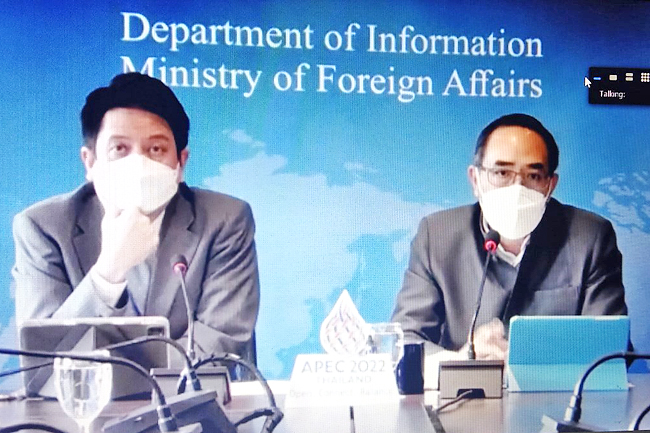Azlan Othman
Thailand is set to host the Asia-Pacific Economic Cooperation (APEC) Leadership Summit from November 18-19, under its main 2022 chairmanship theme ‘Open, Connect, Balance’.
“It is the first in-person APEC summit after the COVID-19 pandemic,” said officials from the Department of Information at Thailand’s Ministry of Foreign Affairs (MFA) during a virtual briefing with the regional media on Thursday.
Director-General of International Economic Affairs Department and APEC Senior Official for Thailand Cherdchai Chaivaivid and Director-General of Information Department and MFA spokesperson Tanee Sangrat said several key issues will be presented at the summit, including the promotion of sustainable and inclusive economic growth, the facilitation of trade and investment, and the post-pandemic rehabilitation of the APEC bloc.
Member economies are also advancing initiatives to strengthen resilience and promote environmental sustainability through approaches, such as the bio-circular-green (BCG) economy model.
Thailand led a substantive discussion on the BCG economy.

The APEC platform was established in 1989 and convenes countries linked to the Asia-Pacific region namely Australia, Brunei Darussalam, Canada, Chile, China, Canada, Hong Kong, Indonesia, Japan, Malaysia, Mexico, New Zealand, Papua New Guinea, Peru, the Philippines, Russia, Singapore, South Korea, Taiwan, Thailand, the United States, Russia and Vietnam. The 2022 APEC summit is set to convene in November in Thailand, which previously hosted the organisation’s summits in 1992 and 2003.
Cherdchai and Tanee also said APEC economies constituted some 38 per cent of the world population, 62 per cent of the world’s gross domestic product (GDP) and 48 per cent of the global trade.
They added APEC is still relevant in the Asia-Pacific region in that the number of free trade agreement (FTA) had increased from 91 back in 2008 to 186 in 2018, while tariff had been reduced from 16.9 per cent in 1989 to 5.2 per cent in 2019.
Meanwhile, APEC economies have succeeded in luring foreign direct investment (FDI) to 67.9 per cent in 2022 from 45.2 per cent in 1990, while the poverty rate has been reduced to 1.8 per cent in 2015 from 41.7 per cent in 1990.
APEC Business Travel Card holders now reach 290,000 this year.
However, the officials said we have not done enough to connect people across border and hence must facilitate more people to travel or to do business across border.
“We need to revive the airline and tourism industry severely affected by the COVID-19 pandemic and put emphasis on connecting people. COVID-19 has reminded us that we are not fully equipped to counter interruption or disruption.“





